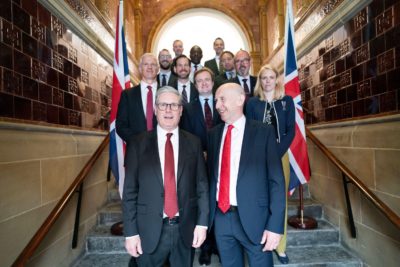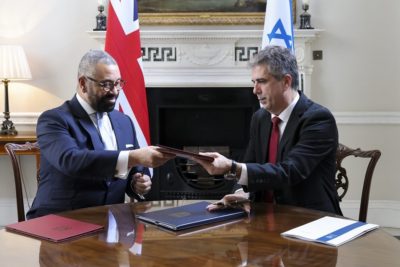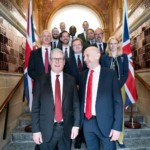‘Honourable and Gallant Members’: Patrician militarism prevails under Labour

The 2024 general election was a flat affair. A historically low turnout returned a blandly technocratic centrist government. For those with a serious interest in foreign policy and military matters there was very little to choose between the big parties.
Even before the election began, the Tories seemed to know the game was up. The sense of inevitability was compounded by Prime Minister Rishi Sunak’s stumbling on defence-nostalgia, a mainstay of British politics, at the very outset. First, over a widely derided pledge to ‘bring back national service’. Second, over his questionable commitment to the 80th D-Day commemorations which fell in the same period. The ‘party of defence’, whose invocations of patriotism, war and empire are so reflexive and have often wrong-footed Labour in the past, never seemed to get out of the blocks.
On election night, a number of so-called ‘big beasts’ of the Conservative party fell, as well as many more minor players. Labour, the party of Iraq and Afghanistan, returned to power as most expected. As press coverage pointed out, the high turn-over of seats presented something of an optical illusion given the low turn-out figures. In many constituencies the difference between the Labour and Tory vote seemed to align closely with the figures for defections to the hard-right anti-immigration party Reform UK.
Among those to depart the Commons benches was artillery officer-turned-Plymouth MP John Luther Mercer – better known as Johnny Mercer – whose outspoken campaigning for veterans, involvement in two new bodies of legislation to inoculate the British war machine against accountability, and on-and-off leadership of the UK’s veterans affairs department, have been objects of critique for ForcesWatch since his election in 2015.
From the start of his political career, Mercer positioned himself as a patrician champion of former service personnel, a politician privileged by his military experience.
Privileged by military experience
From the start of his political career, Mercer positioned himself as a patrician champion of former service personnel, a politician privileged by his military experience. With concerning implications for the wider population that he was elected to represent, the one-time City of London bank intern openly articulated that the defence of ‘our boys’ was the only reason he developed an interest in professional politics. Although he framed his political animus on these narrow grounds, Mercer’s voting record was consistently in line with the Conservative’s ethos and class interests.
Ahead of his general election victory, Keir Starmer presented his veteran candidates at the Fusilier Museum in Bury on 3 June. The unveiling was accompanied by a speech combining a pledge of absolute support for Trident with wistful commentary about military service. In what has become a common overreach for militarists and nostalgists alike, Starmer cited an uncle who served in the Second World War, a war which ended 17 years before he was born and in which he (assuming the tools his father made were not time machines) had no personal involvement.
When the ex-military parliamentary candidates present at the event spoke to the press, the message discipline characterised by the Labour campaign was in evidence. Former Royal Marine and Military Cross winner Al Carns was quoted in the Independent: ‘Collectively, it’s worth noting, Labour has pulled in 100 years of military experience, which I think (is) really good.’
The inference, possibly unthinking, is that ex-soldiers must by dint of their former profession make good MPs. No further qualification needed.
Two former Intelligence Corps members criticised the previous Labour leadership. Louise Jones said otherwise good policies had been ‘negated by the values and standards fails that I was seeing’. While Mike Tapp said: ‘I would not have stood under the last administration, it’s that clear. But under the current administration I’m really confident as a veteran that we can deliver for the country.’ [our emphasis]
Also present was former Royal Marine officer Fred Thomas – Johnny Mercer’s electoral rival. Thomas was, he said, “proud” of how a “laser focused” Starmer had “changed the party”.
The intended effect of this endorsement of Starmer’s Labour by these veterans – all of whom won their seats – was clear. What is less clear is what made the Jeremy Corbyn leadership so objectionable, at least in relation to major defence issues; the 2019 manifesto fully endorsed both Trident and NATO. However, perhaps under Corbyn the status of veterans as MPs would have not been so elevated.
In the event, Labour returned 13 ex-military MPs in the election, although the overall number of members with veteran backgrounds has declined. These MPs will be known, in line with an old tradition restored to the Commons in 2014 by ex-SAS Tory MP Julien Brazier, as “gallant and honourable members” rather than just “honourable members” in reference to their service. War worship in the Commons is no new thing.
Real-life Walter Mitty
Fittingly, one of Mercer’s last headline-making scandals was a public row with his local political rival Fred Thomas, a former Royal Marine officer selected by Labour to run in Plymouth. The sticking point was the legitimacy of the interloper’s military credentials. Thomas was just one of 14 former military personnel who ran for Labour in a bid to overcome ingrained perceptions that the (notionally) centre-left party lacks nous on defence. Not so as it turns out. At least not if the metric is an ability to instrumentalise banal nationalist ideals about military service to get people elected to parliament.
At a fraught Plymouth hustings on 24 June, Mercer claimed that Thomas hadn’t served in combat. Mercer seemed to be raising the level of qualification to be an MP from military service, to physically fighting in a war. This is a difficult position to take, or indeed defend, given the opacity around British special forces in the press and parliament. Moreover, to an electorate whose grasp of what does and does not qualify as combat is likely limited, and in a country which does not classify veterans as ‘combat’ and ‘non-combat’ as in the US, this stipulation means virtually nothing.
Nevertheless, Plymouth Live quoted Mercer as saying, ‘I cannot believe I am standing against a real life Walter Mitty in Plymouth. If there is one place you don’t want to lie about your military service, it is this city’.
A Walter Mitty in British military parlance is someone who inflates or completely makes up their military record. Special forces activity or service is rarely commented upon by the British state, a fact which Mercer must be aware of. It does seem that Thomas’s claims have been corroborated but ‘due to the highly sensitive and recent nature of his role, he remains unable to discuss much of his service’.
Overall, what would turn out to be Mercer’s parting salvo as an elected politician came across as insubstantial, petty and loose with the facts. In his defence this was a British general election where that kind of thing abounds. But it is arguable that these comments go beyond that, capturing the register in which he operated in for much of his time in politics. A reputation for hair-trigger outbursts aside, it would be impossible to say that Mercer wasn’t a key figure around veterans issues. This is especially true on the topic of war crimes allegations in Iraq, Afghanistan and the North of Ireland, but also around veteran’s post-service welfare.
But his final days as an MP were overshadowed by another scandal regarding the conduct of British troops in wartime running back a number of years; the current inquiry into allegations that in the early 2010s members of the UK special forces murdered dozens of innocent civilians in Afghanistan.
Values and Standards?
The Value and Standards of the British Army are a set of ethical guidelines taught by a padre (a military priest) during basic training. As a veteran, it’s odd to see this rather niche and poorly-developed bit of military moral philosophy rolled out so often in politics.
After they are taught, the Values and Standards are then reaffirmed throughout a soldier’s career as part of a sort of mental operating system for conduct both at home and on operations. The values component is captured in the mnemonic CDRILS: Courage, Discipline, Respect for Others, Integrity, Loyalty and Selfless Commitment. The second part – the standards – insist that a soldier’s behaviour should be Lawful, Professional and Acceptable.
Mercer in particular has internalised these and carried them into his post-military life – at least to the extent that he has often quotes them. He and Charles Haddon-Cave, the judge heading the current special forces war crimes inquiry, both drew on the Values and Standards in a fiery public exchange recently.
It followed Mercer’s public refusal to name whistleblowers whom he claims told him important details he included in a witness statement and subsequent in-person hearing. Mercer seems to be motivated by loyalty to special forces colleagues (he himself served with, though not in UKSF). The inquiry has demanded he provide the names and much was made in the press of a potential jail sentence for Mercer for failing to do so.
It is an exchange worth lingering over. On 11 July, Sky News reported that Mercer found it, ‘extraordinary – given my unprecedented support to assist the inquiry, including some names of those who have given me consent – that Mr Haddon-Cave considers it appropriate to repeatedly question my moral courage and integrity in public’.
He accused Haddon-Cave of “fixation” and “bullying”, adding that ‘I gave my word to junior personnel who approached me. I intend to keep it’.
Haddon-Cave repeatedly stated that the inquiry had been set up to protect the identities of special forces personnel and others while allowing evidence to be heard. He also referred to the British Army’s Values and Standards, and said: ‘Integrity requires moral courage to do what is right, even when it may not be popular.’
Mercer further complained about his treatment and that of other veterans in regard to allegations of wrongdoing in wartime. He said courts had, ‘consistently misjudged their handling of these issues, with appalling consequences for serving personnel and veterans, usually of junior rank’.
After the election, Haddon-Cave opted not to exercise his powers against Mercer, who did provide some information according to reports, but otherwise has been very quiet since losing his seat. Perhaps he was a victim of the shift to Labour, or maybe his links to what happened in Afghanistan or the electorate’s desire for a parliamentary representative who is concerned about more than the interests of one relatively small group.
Mercer was groomed to run by Tory grandee Colonel Bob Stewart, and the Tories certainly foregrounded veterans in opposition and in government. Labour have responded in kind, their new batch of ex-forces MPs shows this.
The implication is that there is something in the make-up of people who have spent time in authoritarian institutions that lends itself to serving in parliament.
Patrician militarism here to stay
The notion that military service qualifies people to be democratic leaders is often repeated but never really given a rationale. The implication is that there is something in the make-up of people who have spent time in authoritarian institutions that lends itself to serving in parliament. Notably, this sort of qualification rarely extends to people in other professions. Health workers, scientists, teachers and so on.
Yet while the military employs the ‘Values and Standards’ language, the oversimplified application of them often stand in the place of serious political critique. As the hot tempered row at the special forces inquiry shows, they can be employed on both sides of any argument. And they are certainly no defence against behaviours within the military that readily transgress them.
The growth of patrician militarism has and will continue to shape our politics. We would urge politicians who have served in the forces to look beyond ordained military tropes in order to fairly and democratically serve civil society.
See more: military in society, UK Parliament, democracy, special forces
Like what you read?
> Sign up for our newsletter or blog notifications
> Support our work – from just £2 a month










